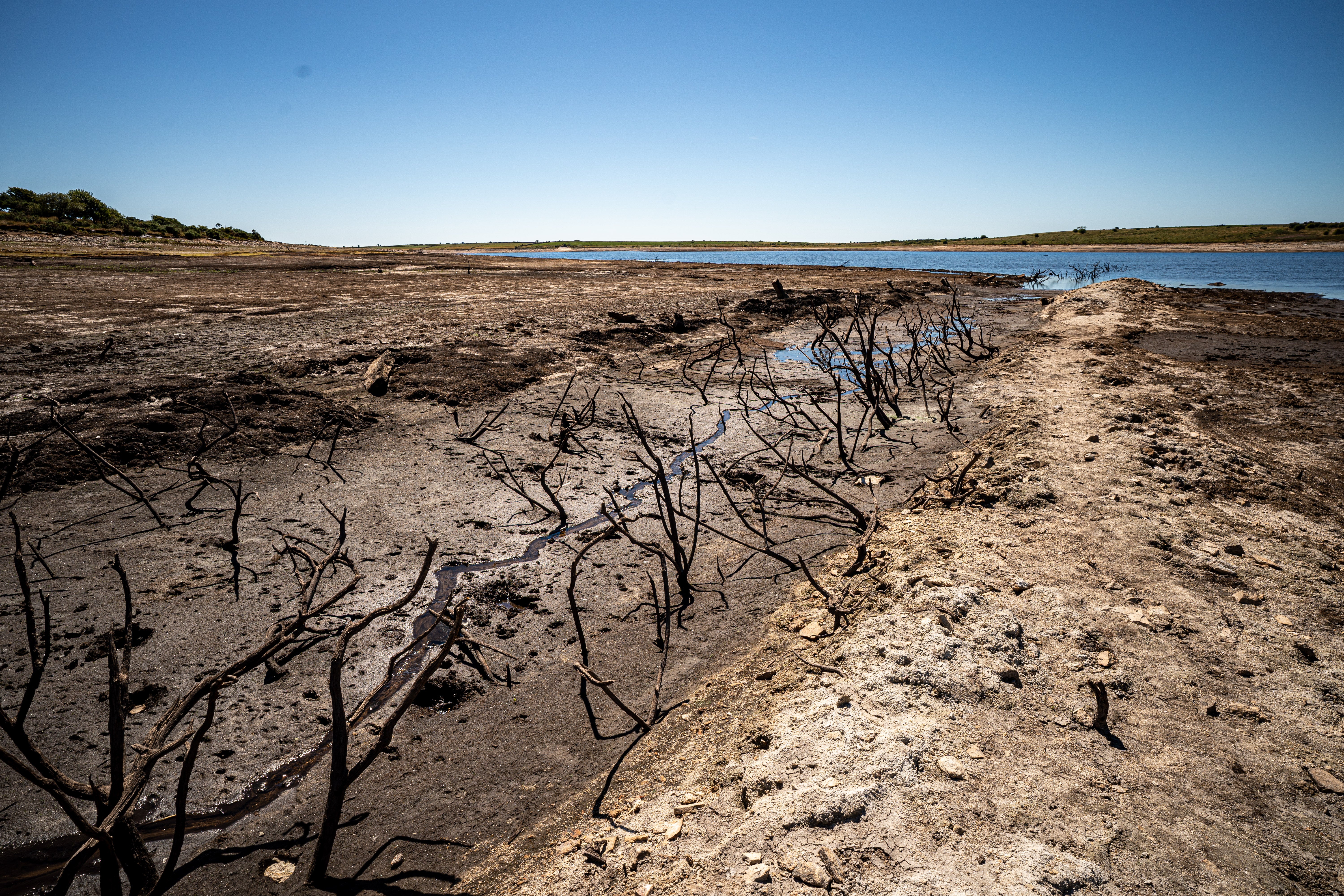Water companies urged to protect supplies as ‘likely very dry autumn’ looms
The call by the Environment Secretary comes as a new heatwave hits the UK in the hot, parched summer.

Water companies are being urged to protect essential supplies heading into a “likely very dry autumn” as the hot, parched summer continues to take its toll.
The UK is experiencing another heatwave, with a week of 30C temperatures forecast and highs of 35C or even 36C predicted in some places as the UK swelters on a very hot weekend.
A Met Office amber warning for extreme heat comes into force for parts of England and Wales from Thursday until Sunday, with the high temperatures likely to affect health, transport and working conditions.
There is also a heat health alert in place from the UK Health Security Agency, with experts advising people to look out for those who are older or with existing health conditions, as well as young children.
The Alzheimer’s Society is urging families and carers to regularly check on people with dementia to ensure they remain hydrated in the heatwave by leaving glasses or jugs of water within easy reach, sharing a drink with them, leaving reminders to drink and providing high water content foods.
Tom Morgan, a meteorologist with the Met Office, said temperatures had reached 30C quite widely across England and Wales on Wednesday.
The latest heatwave was not expected to produce the record-breaking temperatures seen in July, where thermometers climbed above 40C for the first time in the UK, but would still be notable – with some areas getting close to their local or regional records – and lengthy.
“We’re looking at a pretty extended spell of hot weather, with a good seven days of temperatures of 30C or so in some places,” Mr Morgan said.
It comes as the driest first seven months of the year in decades and hot spells have left parts of the UK facing looming drought, prompting hosepipe bans and warnings about the impact on agriculture, rivers and wildlife.
The latest analysis from the UK Centre for Ecology and Hydrology (UKCEH) has warned that low or even exceptionally low river flows and groundwater levels are likely to continue for the next three months in southern England and Wales.
More than three inches of extra rain, in addition to what would normally be expected, is needed to overcome the dry conditions in parts of southern England, but there is no immediate sign of rain in the forecast.
Environment Secretary George Eustice has met with chief executives of water companies, who he said had assured him that water supplies remained resilient across the country.
“Each company has a pre-agreed drought plan which they are following, and I have urged them to take any precautionary steps needed to protect essential supplies as we go into a likely very dry autumn,” he said.
Thames Water has had to supply bottled water for residents in the village of Northend in Oxfordshire and pump water into the network, after supplies were disrupted due to what it said was a technical issue at Stokenchurch Reservoir in the county.
The firm later said it had managed to “improve the situation” and all customers in the nearby area should now have water, but it warned pressure could be lower than normal.
It comes after the company, which supplies water to 15 million customers across London and the Thames Valley, became the latest water firm to signal it will bring in a hosepipe ban in the face of the hot, dry summer.
Three other water companies – South East, Southern and Welsh Water – have announced hosepipe bans for customers in areas they supply.
Our rivers are drying up, fish and other wildlife are dying and not just on small streams
The Angling Trust has called for water companies to “stop dragging their feet” and implement hosepipe bans in all affected areas and for the Government to declare a drought, as rivers dry up, hitting fish and other wildlife.
Martin Salter, chief policy adviser to the Angling Trust, said: “Our rivers are drying up, fish and other wildlife are dying and not just on small streams.
“Big rivers, like the Thames, are suffering and has now dried up along a five-mile length from its source for the first time ever.
“And yet right now millions of gallons of scarce water is being wasted keeping golf courses and lawns green rather than helping rivers survive and our wildlife and economy protected.”
He said water policy in the UK “has been a complacent shambles for decades” and the country should have planned for population growth and climate change a generation ago.
The charity is calling for companies to fix leaks, for improved water efficiency in homes and for more reservoirs to be built to create more storage.
Water companies have faced criticism for bringing in hosepipe bans while leaking billions of litres of water a day from their networks and awarding high bonuses to executives.
Elsewhere, grass fires have broken out as the heat and lack of rain have left countryside, parks and gardens tinder dry, prompting calls for people not to have barbecues and for disposable barbecues to be banned.
Climate change is making heatwaves more intense, frequent and likely, with last month’s record temperatures made at least 10 times more likely because of global warming and “virtually impossible” without it, research shows.
Scientists also warn the likelihood of droughts occurring is becoming higher due to climate change, driven by greenhouse gas emissions from burning fossil fuels and other human activities.
Bookmark popover
Removed from bookmarks